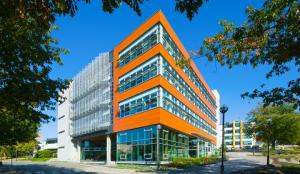
Delegates from the UBC's sustainability leadership are contributing to global discussions on the challenges of sustainable urban development in the 21st century and the role universities can play in addressing them. The 2015 International Sustainable Campus Network conference, Expanding the Dialogue: Sustainability in a Connected World, hosted in Hong Kong June 17-19, brings together experts and practitioners from across the globe to enable cross-cutting communication and connections between higher education, business, government and civil society.
 In January 2015, ISCN recognized UBC’s sustainability leadership by selecting the Centre for Interactive Research on Sustainability as one of 25 “best practice” case studies in Developing Skills for Future Leaders, a report presented at the 2015 World Economic Forum Annual Meeting in Davos, Switzerland.
In January 2015, ISCN recognized UBC’s sustainability leadership by selecting the Centre for Interactive Research on Sustainability as one of 25 “best practice” case studies in Developing Skills for Future Leaders, a report presented at the 2015 World Economic Forum Annual Meeting in Davos, Switzerland.
As part of this year's conference programming, UBC’s Associate Provost, Sustainability, Dr. John Robinson and UBC Sustainability Initiative Director of Communications and Community Engagement, Victoria Smith, have been selected to present on UBC's sustainability initiatives.
 In addition to moderating a session on Regional Perspectives on Global Change, Dr. Robinson was invited to present on UBC’s new 20-year Sustainability Strategy and the role of the campus as a test-bed to explore regenerative sustainability and address critical issues facing our societies. Participating in a working group on Integration of Research, Teaching and Facilities, Victoria Smith will present UBC's Sustainability Scholars program as a platform to share sustainability expertise with community partners while providing students with funded internship projects.
In addition to moderating a session on Regional Perspectives on Global Change, Dr. Robinson was invited to present on UBC’s new 20-year Sustainability Strategy and the role of the campus as a test-bed to explore regenerative sustainability and address critical issues facing our societies. Participating in a working group on Integration of Research, Teaching and Facilities, Victoria Smith will present UBC's Sustainability Scholars program as a platform to share sustainability expertise with community partners while providing students with funded internship projects.
UBC’s involvement in this conference is indicative of the University’s recognized global leadership in sustainability and its commitment as an agent for positive change beyond the campus.
“What we’re doing at UBC that I think is really exciting is trying to deeply integrate [academic and operational sustainability]. So it’s the institution as a whole taking on sustainability, not just individual researchers or teachers or operational staff,” said Dr. Robinson.
As a test bed for sustainability practices and technologies, UBC is positioned to advance next generation sustainability, and develop a model community that demonstrates how societies can move beyond just harm reduction and towards simultaneous improvements in both human and environmental wellbeing.
Since 2007, ISCN Conferences have been hosted in Europe, Asia and North America.
For more information about how UBC's sustainability efforts align with the ISCN-GULF Sustainable Campus Charter, read UBC's 2013-2014 ISCN Charter Report.